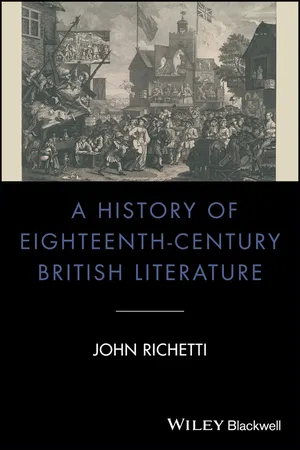
A History of Eighteenth-Century British Literature
John Richetti
- English
- ePUB (mobile friendly)
- Available on iOS & Android
A History of Eighteenth-Century British Literature
John Richetti
About This Book
A History of Eighteenth-Century British Literature is a lively exploration of one of the most diverse and innovative periods in literary history. Capturing the richness and excitement of the era, this book provides extensive coverage of major authors, poets, dramatists, and journalists of the period, such as Dryden, Pope and Swift, while also exploring the works of important writers who have received less attention by modern scholars, such as Matthew Prior and Charles Churchill. Uniquely, the book also discusses noncanonical, working-class writers and demotic works of the era.
During the eighteenth-century, Britain experienced vast social, political, economic, and existential changes, greatly influencing the literary world. The major forms of verse, poetry, fiction and non-fiction, experimental works, drama, and political prose from writers such as Montagu, Finch, Johnson, Goldsmith and Cowper, are discussed here in relation to their historical context. A History of Eighteenth-Century British Literature is essential reading for advanced undergraduates and graduate students of English literature.
Topics covered include:
- Verse in the early 18 th century, from Pope, Gay, and Swift to Addison, Defoe, Montagu, and Finch
- Poetry from the mid- to late-century, highlighting the works of Johnson, Gray, Collins, Smart, Goldsmith, and Cowper among others, as well as women and working-class poets
- Prose Fiction in the early and 18 th century, including Behn, Haywood, Defoe, Swift, Richardson, Fielding, and Smollett
- The novel past mid-century, including experimental works by Johnson, Sterne, Mackenzie, Walpole, Goldsmith, and Burney
- Non-fiction prose, including political and polemical prose
- 18 th century drama
Frequently asked questions
Information
1
Verse in the Early Eighteenth Century, I: Pope, Gay, Swift
I. Alexander Pope
This Essay affords an egregious instance of the predominance of genius, the dazzling splendour of imagery, and the seductive powers of eloquence. Never were penury of knowledge and vulgarity of sentiment so happily disguised. The reader feels his mind full, though he learns nothing…Surely a man of no very comprehensive search may venture to say that he has heard all this before; but it was never till now recommended by such a blaze of embellishment, or such sweetness of melody. The vigorous contraction of some thoughts, the luxuriant amplification of others, the incidental illustrations, and sometimes the dignity, sometimes the softness of the verses, enchain philosophy, suspend criticism, and oppress judgement by overpowering pleasure.2
Table of contents
- Cover
- Title Page
- Table of Contents
- Acknowledgments
- Introduction
- 1 Verse in the Early Eighteenth Century, I
- 2 Verse in the Early Eighteenth Century, II
- 3 English Verse, III: Mid‐Century Onwards
- 4 Eighteenth‐Century Verse, IV
- 5 Prose Fiction in the Early Eighteenth Century
- 6 Prose Fiction in the Mid‐Eighteenth Century
- 7 The Novel Past Mid‐Century: New Directions and Experiments
- 8 Non‐Fictional Prose, I
- 9 Non‐Fictional Prose, II
- 10 Eighteenth‐Century Drama
- Index
- End User License Agreement